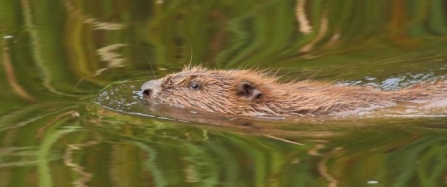
Photo by Mike Symes

Photo by Mike Symes
Beavers will be re-introduced to a specially fenced area, upstream of Ladock village, just outside Truro. Ladock has suffered severe flooding in recent years and this project is designed to help. Universities will study the before and after impacts of the beavers – something never done before at this scale in an intensively farmed landscape like Cornwall. The project will build on research from other re-introductions in the UK and Europe, putting Cornwall on the global map. The results will help find out if this long-lost species could once again become part of the Cornish landscape to help us combat flooding in a natural way.
Frank Howie, Cornwall Wildlife Trust Trustee says,
“Cornwall Wildlife Trust has been interested in re-introducing beavers to the county for several years. Successful re-introduction could help to reduce flooding problems whilst certainly creating new habitats for wetland wildlife. We are truly excited to be involved in bringing beavers back to Cornwall. It is a once in a life-time event and we hope everyone will support our Crowdfunding campaign to make this happen.”
Two adult beavers will be introduced to a purpose-built five acre enclosure that contains prime beaver habitat and a stream that flows into the Tresillian River. Scientists from the University of Exeter have been studying the stream for over a year now.
Professor Richard Brazier, from the University of Exeter said,
“From measuring how much water runs through the stream during heavy rainfall, to recording pollution, the data collected before and after will show the true impacts of the beavers once they’ve been introduced. That’s what makes this project unique in the UK. The Woodland Valley Farm site is the perfect location and scale to show how effective beavers are at creating lots of environmental benefits and crucially whether their activity could reduce Ladock’s flooding problems.”
Beavers feel safe when they are close to water, so they build dams to create new ponds and dig water channels allowing them to move around their territory to get food. Beavers are vegetarians and eat mainly grass and leaves during summer and twigs and bark in winter; they don’t eat fish, this is a common misconception. Creating more wetland like this enables the land to hold back more water. This means that during very heavy rainfall water flows more slowly into rivers, which helps to prevent them overflowing and bursting their banks. This same activity helps make river water cleaner. Slower flow of water causes soil sediment and pollutants to settle at the bottom of beaver ponds, essentially removing them from stream water and trapping them away.

Photo by Adrian Langdon
Beavers also have an impressive effect on other wildlife. Animals such as frogs, newts and toads, as well as fish, birds and bats all benefit from having beavers around. At an enclosed site where beavers were reintroduced in Devon, by Devon Wildlife Trust; the number of frog spawn clumps went from 10 to 580 over five years, aquatic insect species increased almost three-fold in just one year and the number of different bat species feeding at the site increased.
Chris Jones, Farmer at Woodland Valley said,
“I can’t wait to get the beavers on the farm and watch what they do. The site at the moment has one pond, the stream, a young even-aged tree plantation and not a great variety of plants – but the beavers could transform it into a truly natural wetland oasis. I’m really hoping the amount of wildlife and wetland increases.”
Cornwall Wildlife Trust will be launching a Crowdfunder campaign in April to raise the funds needed to bring beavers back to Cornwall. For more information about the project please visit www.cornwallwildlifetrust.org.uk/beaverproject, call the Trust on (01872) 273939, or find them on Facebook (@cornwallbeaverproject) and Twitter (@cornwallbeaver).